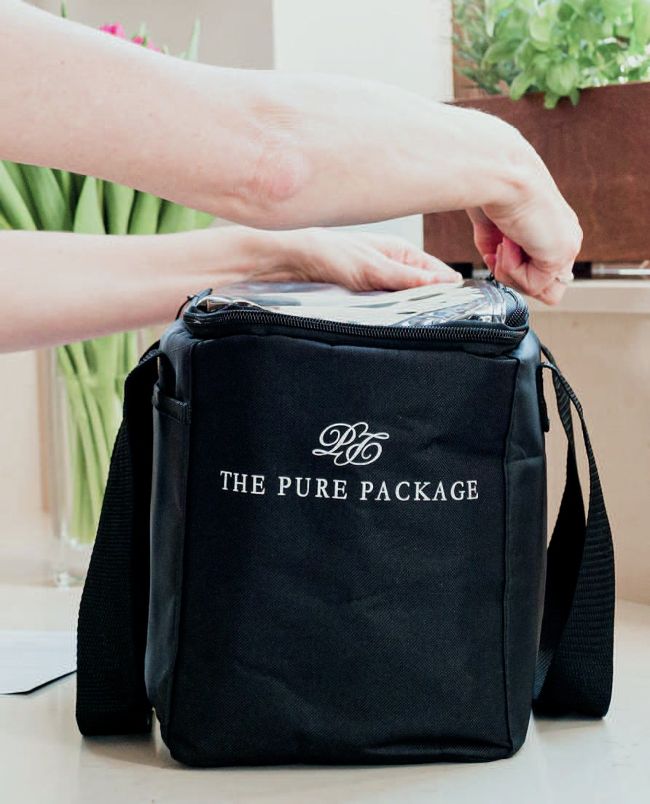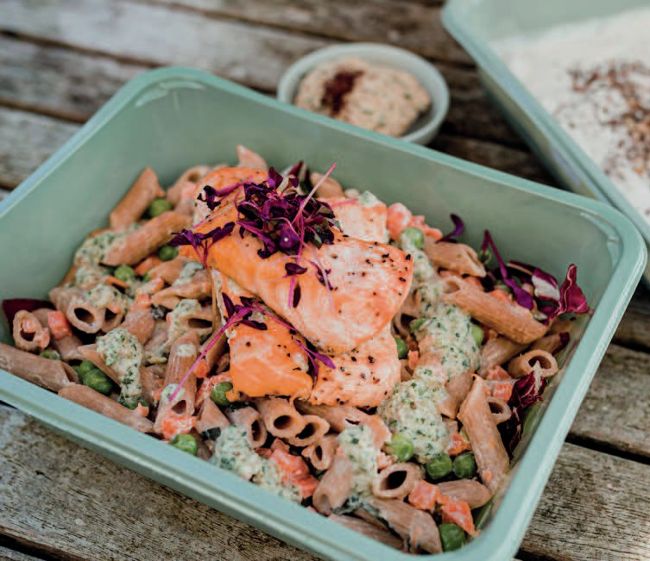THE ROLE OF NUTRITION IN AESTHETIC MEDICINE
Preparing your patients for surgery is like preparing athletes for a major sports event. Author and food entrepreneurJenniferIrvine looks at whether the adage “failing to prepare is preparing to fail” holds, for cosmetic surgery
Ensuring your patients’ optimal health before a procedure can significantly improve the outcome. The standard practice advises patients to avoid substances such as alcohol or nicotine and often suggests vitamin supplementation before surgery. However, how much emphasis do you place on nutrition in your pre- and post-operative plan for patients?
Nutritional status has a significant impact on surgical outcomes, and recent studies have shown that even the last few meals before surgery can affect recovery. As a result, most aesthetic providers are recommending patients adopt a proper diet plan before and after surgery to achieve the best results.
Surgical procedures are typically scheduled weeks or months in advance, providing a timely opportunity to advise patients to increase their intake offoods rich in nutrients essential for recovery. Consuming protein and healthy fats can aid in the creation of new blood cells and collagen. Protein is also vital for maintaining a strong immune system. Natural stress responses, such as those triggered by surgery, can result in the formation offree radicals, which can damage tissues and impede the healing process. Incorporating a variety of fruits and vegetables, particularly green leafy vegetables, into their diet can help individuals combat free radicals
FOODS TO RECOMMEND BEFORE SURGERY
Unprocessed carbohydrates like sweet potatoes Despite carbohydrates’ bad reputation, healthy, unrefined carbohydrates are an essential part of a balanced diet. They are the body’s preferred source of energy, and some are surprised to learn they often come in the form of vegetables. Sweet potatoes can not only provide the energy required to heal, but an abundance of healing enzymes, vitamins, and minerals, including carotenoids that may enhance immune response.
Lean protein like chicken or turkey Poultry such as chicken and turkey are considered lean sources of protein. Their meat is low in fat but high in quality protein, providing amino acids which are the building blocks for repair. Glutamine and arginine are present in both chicken and turkey, these are amino acids that aid in recovery and wound healing.
Plant-based fats including plenty of nuts and seeds Both nuts and seeds provide a wealth of plant protein, healthy fats, vitamins, and minerals, all of which support healing. As well as being an invaluable energy source, they help the body to absorb nutrients from other foods we consume. Nuts, particularly almonds, are high in vitamin E, which acts as an antioxidant in the body, protecting against cellular damage, and helping to minimise scaring. Vitamin E also improves the production of protective immune cells to help fight off any infection.
Shellfish Shellfish like mussels, prawns, and clams are rich in the mineral zinc, which is important for optimal immune function, and needed to protect against any risk of infection.
Awide variety of antioxidant-rich fruits and vegetables As important as what patients should eat before their cosmetic procedure is what they should avoid. It is recommended that patients steer clear of high doses of omega- 3s, which can thin the blood, as well as foods high in sodium.
FOODS TO RECOMMEND AFTER SURGERY
Post-operative nutrition is of equal, if not greater, importance than eating right before the big day. Many aesthetic providers advise their patients to schedule food deliveries when they return home after surgery to encourage the patient to rest, this also allows the patient to pre-plan their meals. This is not a time for them to slip into a bad diet. They will understandably crave comfort food, but most of all they will desire convenience. With my clients, we pre-plan personally tailored meals in advance of their surgery so that the meals can be delivered from the moment they return home.
After the body experiences trauma, adequate nutrition helps it heal and recuperate. Since vitamins and supplements are generally frowned upon in the weeks following, properly fuelling your body with food is more important than ever.
Green leafy vegetables Green leafy vegetables like spinach, kale, and cabbage, are brimming with vitamins, minerals and fibre. Fibre is essential, particularly for those recovering from a treatment involving anaesthetics. The digestive system can be caused to slow right down because of anaesthesia. Fibre is known to help to keep things moving and prevent constipation in patients who have undergone a general anaesthetic.
Berries Berries are rich in phytonutrients, plant compounds which will help support your patient’s recovery. They are particularly high in antioxidants known as anthocyanins, which give berries their characteristic bright colours. Anthocyanins are known to promote anti-inflammatory, anti-viral and anticancer benefits. Berries are rich in vitamin C, essential for stimulating the production of collagen, the protein most involved in wound healing. This can help speed up the healing of any scars following a treatment. Blueberries and blackberries are the highest in antioxidants.
Omega 3-rich foods like salmon Salmon is packed with protein and essential omega-3 fats. ‘Essential’ means these fats cannot be synthesised by ourbodies and must be obtained through diet. These omega-3s are particularly beneficialfor reducing inflammation, as well as promoting wound healing and enhancing immune response. However, salmon, and other sources of omega-3 fats (otheroily fish, walnuts, flaxseeds, and chia seeds), should be reserved forpost-treatment ratherthan pre-, as high doses of omega-3s can thin the blood.


Eggs When required to heal, the body requires significantly more protein than usual, depending on the type and severity of treatment. Eggs are a great source of easily absorbed protein (providing on average 6g of protein per large egg!). They also contain a variety of nutrients that support wound healing and immune health, including vitamins A and B12, iron, zinc, and selenium. They are versatile ingredients and can be prepared ahead of time for maximum convenience during the recovery stage.
Probiotic and prebiotic foods Some treatments may require a course of antibiotics which can wreak havoc on the gut. Adding a probiotic-rich yoghurt to your patient’s daily routine can help to restore balance to the digestive system. Advise clients to look out for yoghurts with added live and active cultures. The healthy bacteria can help boost the immune system and fight off infections. Other probiotic rich foods include kefir, kimchi, and sauerkraut. Prebiotics (such as garlic and onion) will also help to boost immunity — an important part of healing. Anti-inflammatory spices such as turmeric can also be helpful.
Water Staying hydrated is essential for optimal health at all times. However, its importance becomes even more pronounced when the body is fighting to recover. Plenty of water is required to counteract any slowing of digestion or bloating because of anaesthesia. Hydration is therefore essential for optimal wound healing and care.
IN CONCLUSION
The most important diet for a patient is the one they can stick to. Between the initial consultation, booking, treatment and recovery stages, many patients can feel overwhelmed, with food and dietary choices being the last thing on their mind. Meal delivery services like The Pure Package can be a real saving grace for many, taking away the stress of planning, buying, preparing, and cooking every meal. Patients can rest assured that they are receiving nutritionally balanced meals, tailored to their individual needs. Maintaining vital nutrients needn’t be one more thing to worry about. Patients can get the most from their treatments and optimise their results with a commitment to their nutrition and overall health.
Find out more about nutritionally focused food delivery companies, The Pure Package and sister company, Balance Box at purepackage.com and balancebox.com.
JENNIFER IRVINE
Jennifer Irvine is a food entrepreneur, author, spokesperson, and busy mother of four. Irvine launched The Pure Package in 2003, having recognised that those leading a busy modern life in London often found it impossible to source and prepare the best, nutritionally balanced food. Her unique concept has developed into an award-winning business with an enviable celebrity following. In January 2013, she successfully launched The Pure Package’s sibling, Balance Box, developing her business into a UK-wide venture. Irvine is also the creator and chair ofThe Wellness Awards which she established in 2016, designed to honour and celebrate the stars of the British health and wellness industry.